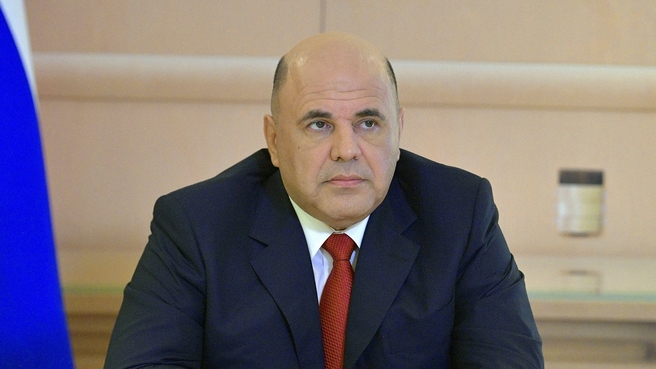The participants in the videoconference discussed measures to contain the coronavirus infection, including in the context of relaxing the lockdown restrictions in several regions.
Opening remarks by Mikhail Mishustin
Report by Mikhail Murashko on organising the provision of medical assistance to Russian regions
Excerpts from the transcript:
Mikhail Mishustin: Good afternoon, colleagues.
Today we are discussing measures to contain the novel coronavirus infection.
Even with the lockdown restrictions relaxed in a number of regions, all the preventive measures must still be continued to avoid any risk to people’s health and their families. We will continue to increase the number of tests performed every week.
On average, we perform about 300,000 tests per day, which adds up to a total of more than 15 million around the country. Russia is among the global leaders by the number of tests and the first country that is not cutting down on tests even after the pace of the infection began to slow down. It is important for evaluating the entire picture, but above all, to reduce the number of severe cases. Indeed, thanks to a timely test, the disease can be quickly diagnosed and treatment started. A number of leading European countries are also adopting this policy. This also confirms that Russia’s approach is effective. We will continue to test the people for the coronavirus.
The situation with the spread of the infection, according to current data, is gradually improving. Such places as Moscow, the Moscow Region, as well as a number of other regions of the Russian Federation are already showing positive trends. On the other hand, there are areas where the outbreak happened later. And, taking into account the way this infection develops, the number of COVID-19-positive cases detected there is still on the high side. The Ministry of Healthcare dispatches special visiting medical teams of experienced professionals to the affected regions. Specialists from federal clinics have already made 16 trips to 11 regions. They help identify new cases and effectively organise the treatment of patients, and also advise the local doctors on the most severe cases.
During this work, specialists from the Ministry of Defence, the Emergencies Ministry, and Rospotrebnadzor are effectively cooperating with the Ministry of Healthcare. Teaming up with the regional authorities, they have been able to provide effective medical care to contain the spread of the infection.
An example of such cooperation can be seen in Dagestan. The combined efforts have ensured the provision of medical care and the supply of medication, and even significantly reduced the number of new infections.
This work will certainly continue. Each region that needs help from the federal government will receive it promptly.
Before we move on to the discussion, I would like to hear what Mikhail Murashko, the Minister of Healthcare has to say.
Mr Murashko, please report in more detail on how the process of providing medical assistance, including in the affected regions, is going on.
Mikhail Murashko: Good afternoon, Mr Mishustin, colleagues.
To begin with, we have created a system that allows us to monitor, in real time, the number of people infected with the coronavirus, including those in outpatient and inpatient care. We also keep track of the occupancy of beds around the country and can make decisions quickly. We are aware of the workload of intensive care units, which is important, because we know that in some countries struggling with the coronavirus outbreak, medical workers had to make difficult decisions about providing intensive care to patients.
What we see today is a smoothly organised process of inpatient and outpatient care that avoids overwhelming intensive care units, and Russia has large ICU bed reserves.
I would also like to add that the disease outcome is monitored in each case. Medical workers are required to record the results of treatment of the coronavirus infection with the medication prescribed for the infection, in our information system.
The work of our federal remote advisory centres is complemented with teams that travel to the regions to provide assistance. You have cited the precise figure – 11 regions. Tomorrow the next group is departing to the Amur region. Together with Bashkortostan, we are dispatching federal and regional specialists to Karachayevo-Circassia. We have sent a team to Kamchatka, and another group led by a deputy minister of healthcare is working there together with Moscow specialists. This practice helps provide specific care to patients and improve outcomes.
The specialists are also helping contain the outbreaks at medical institutions serving non-COVID patients – chief specialists from the Ministry of Healthcare, leading specialists from Moscow clinics, including FMBA clinics.
As for Dagestan, our experience has enabled us to stabilise the situation in that region in a fairly short period of time (three weeks). The Ministry of Defence, Rospotrebnadzor, FMBA, Healthcare Ministry, as well as federal and regional clinics joined the effort. The region has stabilised, not only in terms of incidence, but also in better outcomes. Look at the level of testing – an important component – over the last month, the number of people tested increased by more than 6 times. This is the sort of cooperation between the federal and regional authorities and agencies capable of helping to stabilise the situation that allows us to achieve good results in a short period of time.
I fully agree that people’s observing sanitary and epidemiological measures of hygiene is a crucial factor in preventing and reducing the disease incidence.
<…>













